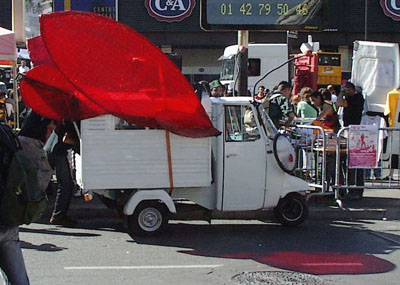Topic: For policy wonks...
A Nation of Victims: The moral basis for redress, retaliation and even revenge in order to right any given wrong - real or imagined
Now and then I mention my conservative friend who argues that FDR is the man most responsible ruining America, for turning us into a nation of victims - actually a nation of people who believe they are victims - who believe the world owes them something, when it doesn't. The evil stared with the Social Security programs in the thirties and continues today with all forms of welfare, unemployment compensation, worker compensation, wage and labor laws, workplace safety laws, and the whole concept of product liability, or any restrictive regulation of industry. Add government-funded healthcare of any kind, and all the environmental laws that hobble heavy industry. Each of these - and all of these, cumulatively - makes people believe they need not take "personal responsibility" for their lives, that the world owes them something. This putative social safety net has turned us into a nation of whiners, not doers.
The self-made man, who creates success, pulling himself up by his own bootstraps, and asks nothing of anyone, but on his own initiative builds wealth and capital and thus makes the world better, is fast disappearing. And the few self-made men who built the industries that makes all our lives better, and built them with no one's help, should they become wealthy, have what they earned on their own taken away from them in taxes to pay for those who get a free ride, or who have the government pay for their cushy retirement, or pay them when they are injured at work or maimed by a defective product. It's not fair. These freeloaders should take responsibility for their lives, and do something with them. They're just whiners.
I'm sure you've heard the argument. And it's not just my friend, or the readers of the late Ayn Rand. George Bush grew up believing this. As someone who knew him as a young man says -
Bush has softened his words over the years, but the concepts stay with him, as he runs our government for us on these principles.At Harvard Business School, thirty years ago, George Bush was a student of mine. I still vividly remember him. In my class, he declared that "people are poor because they are lazy." He was opposed to labor unions, social security, environmental protection, Medicare, and public schools. To him, the antitrust watch dog, the Federal Trade Commission, and the Securities Exchange Commission were unnecessary hindrances to "free market competition." To him, Franklin Roosevelt's New Deal was "socialism." ...
This is the core disagreement between those now in power, the conservative right, and those now seeking power, the liberal progressives. Is there a social contract, and does it involve the government in any way?
The odd thing is how this "playing the victim is irresponsible" idea is playing out now with the war.
What?
Yes, and here is an analysis that is worth reading in full.
A hierarchy of suffering
Since 9/11, America has used its victimhood to demand a monopoly on the right to feel and to inflict pain
Gary Younge, The Guardian (UK), Monday September 20, 2004
The key points, should you not use the link?
After an introduction specific to his UK readers, Younge gets down to the real issue - (my emphases throughout, and his British spelling) -
Younge the argues that such arguments were always flawed, and now they are beginning to look "downright farcical." Why? Because the right has now decided to play the victim, and whine.Victimhood is a powerful, yet contradictory, force. Powerful because, once claimed, it can provide the moral basis for redress, retaliation and even revenge in order to right any given wrong - real or imagined. The defence of everything from the death penalty to affirmative action, Serbian nationalism to equality legislation, are all underpinned, to some degree, by the notion of victimhood. Contradictory because, in order to harness that power, one must first admit weakness. Victims, by their very nature, have less power than their persecutors: victimhood is a passive state - the result of bad things happening to people who are unable to prevent it.
In the past, the right has exploited this tension to render victimhood a dirty word - a label synonymous with whingers, whiners, failures and fantasists. Revealing no empathy with the powerless nor any grasp of historical context, they wilfully ignore the potential for victimhood to morph into resistance, preferring instead to lampoon it as a loser's charter.
"The left had become little more than a meeting place for balkanised groups of discontents, all bent on extracting their quota of public shame and their slice of the entitlement pie," wrote columnist Norah Vincent three years ago. "All of them blaming their personal failures on their race, their sex, their sexual orientation, their disability, their socioeconomic status and a million other things."
He notes some UK examples, then adds this -
Well, it's hard being a fundamentalist straight Christian these days. Everyone is always picking on you. Whine, whine, whine....... Across the Atlantic, the right's new role as victims is even more prevalent and pronounced. Straight relationships are threatened by the prospect of gay marriage, white workers are threatened by affirmative action, American workers are threatened by third world labourers, America is threatened by everybody.
At times, this means the powerful appropriating the icons, tropes and rhetoric of the powerless in their entirety, to hilarious - if disturbing - effect. Last year Roy Moore, the former Republican chief justice of Alabama, led a failed bid to keep a monument of the Ten Commandments in his courthouse. Standing before a group of supporters, some of whom were waving Confederate flags, emblem of the slave-holding South, he said: "If the 'rule of law' means to do everything a judge tells you to do, we would still have slavery in this country." Wearing T-shirts proclaiming "Islam is a lie, homosexuality is a sin, abortion is murder", they then sang We Shall Overcome.
In these cases, victimhood serves merely as a pretext for a backlash to reassert, extend or expand the dominance of the powerful. If these people are victims of anything, it is of the threat to their entitlement and privilege.
Younge does point out though that genuine suffering often acts as a precursor to genuine vindictiveness, and explains this is terms of what is going on with the Israeli-Palestinian conflict these last few years. Everyone is a victim. All is justified. Really?
But he saves his real scorn for his cousins across the pond.
Well, we are superior - put on this earth by God to spread (enforce) our flavor of democracy and our form of privatized, deregulated capitalism all over the earth, for everyone's good. George Bush actually says that, repeatedly - freedom is God's gift to the world, and we're doing His work.But nowhere is the abuse of victimhood more blatant than in the US presidential election, where September 11 remains the central plank of the Republicans' strategy for re-election. The fact that their campaign begins with the terror attacks is not only understandable but also, arguably, right - this is the most significant thing to happen in the US since Bush assumed office.
The trouble is that the campaign's message ends with that day also. September 11 has served not as a starting point from which to better understand the world but as an excuse not to understand it at all. It is a reference point that brooks no argument and needs no logic. No weapons of mass destruction in Iraq? "The next time, the smoking gun could be a mushroom cloud?" No United Nations authority? "We will never again wait for permission to defend our country." No link between Saddam and al-Qaida? "They only have to be right once. We have to be right every time."
This is the real link between Iraq and 9/11 - the rhetorical dissembling that renders victimhood not a point from which they might identify with and connect to the rest of humanity but a means to turn their back on humanity. They portray America's pain as a result of 9/11 not only as unique in its expression but also superior in its intensity.
And people just don't get it, and keep killing our guys in their streets. It's just not right.
I guess the Bush policy argument is no one has ever been wronged as we have been wronged, so we are now free to do what want. So join us, or get of the way, or die. What the argument lacks in subtle and sense, it gains in force and nobility. (Note: That would be the nobility of suffering. It's a Jesus/martyr thing.)
As my late father used to say when amused and exasperated - What is this happy horseshit?
Younge is more detailed than my late father, if less direct -
Yeah? But we're special.When 3,000 people died on September 11, Le Monde declared: "We are all Americans now." Around 12,000 civilians have died in Iraq since the beginning of the war, yet one waits in vain for anyone to declare that we have all become Iraqis, or Afghans, let alone Palestinians. This is not a competition. Sadly, there are enough victims to go around. Sadder still, if the US continues on its present path, there will be many more. Demanding a monopoly on the right to feel and to inflict pain simply inverts victimhood's regular contradiction - the Bush administration displays material strength and moral weakness.
Yeah, right. And you know, I'm becoming more like my father every day.
__
Note:
You might want to click on a companion piece on the Guardian opinion page....
Democracy: our cause, Iraq's sacrifice
Peter Preston, Monday September 20, 2004
Some clips as a tease...
Now go and read the whole thing.Freedom, it seems, is to be won by the blood of others. Freedom is our single transferable gift to them, our shield against darkness. But meanwhile, Guant?namo Bay, and umpteen steely sonatas from John Ashcroft and David Blunkett, is our gift to ourselves.
Freedom, though, is also the freedom to ask awkward questions, to inquire of our masters: please, what happens next? And here the rhetoric fades to a mumble.
... The president of the United States, with 140,000 troops on the ground who want to come home, talks about something else. His official campaign website (the one that swing voters can turn to) solves the problem by barely mentioning it.
"Fifty million people have been liberated from despotic, totalitarian regimes in Afghanistan and Iraq," it says. "The brutal regime of Saddam Hussein is gone, and an interim regime is leading the Iraqi people to freedom." And that's it, period. Re-elect Bush and Cheney and what do you get? A blank page.
Try Kerry and Edwards on the big issue, then? Forget that, too. Let's "plan Iraq's future by working with our allies", they say. Let's "launch a massive and accelerated training effort to build Iraqi security". Let's get our boys home by 2008, employing a plan too secret to describe in even vestigial detail.
But there's a terrible mis-match here. We ask the Iraqis to suffer and endure in a cause we hold dear, yet we tell neither them nor our own voters the truth. We hail democracy as some wonder ingredient, yet close the packet closer to home.
... Here is a problem without a solution. And, inescapably in a democracy, it is our problem.
Posted by Alan at 20:31 PDT
|
Post Comment |
Permalink
home





